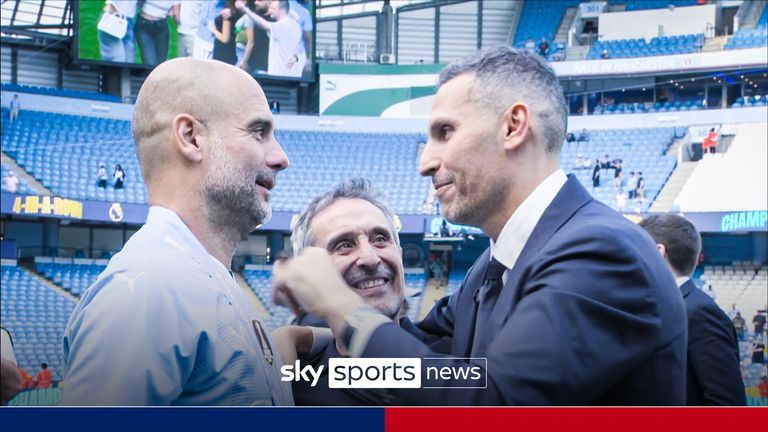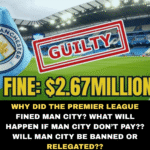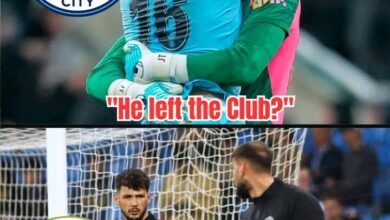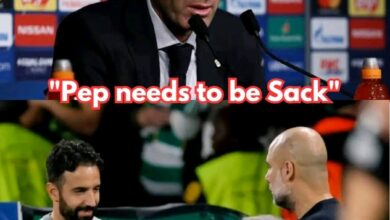New Man City case timeline emerges amid 115 charges verdict delay and Arsenal wait

Manchester City finds itself embroiled in what many consider the most significant legal battle in modern football history. The club, which has dominated English football over the past decade, now faces two separate but interconnected legal challenges that could fundamentally alter the landscape of the Premier League and potentially reshape City’s future. With 115 alleged financial charges hanging over them and a concurrent dispute over sponsorship rules, the coming months and years will prove pivotal for Pep Guardiola’s side.
The complexity of these legal proceedings extends far beyond simple rule violations. At stake is the very integrity of the Premier League’s financial regulations, the competitive balance of English football, and Manchester City’s position as one of Europe’s elite clubs. As Arsenal and other Premier League rivals watch from the sidelines, the outcomes of these cases could have far-reaching implications for every club in the division.
The 115 Charges: Understanding the Scope of Allegations
The most significant challenge facing Manchester City involves 115 alleged breaches of Premier League financial rules spanning a nine-year period. These charges, which City vehemently denies, represent an unprecedented level of scrutiny for any Premier League club. The allegations cover a wide range of potential violations, each carrying serious implications for the club’s reputation and future.
The charges primarily focus on allegations that City provided misleading financial information to the Premier League, potentially inflating sponsorship revenues and underreporting true expenditures. The investigation centers on the period between 2009 and 2018, during which City transformed from a mid-table English club into a global footballing powerhouse under the ownership of Sheikh Mansour and the City Football Group.
Central to these allegations is the claim that City may have circumvented Financial Fair Play (FFP) regulations through creative accounting practices. The Premier League’s investigation suggests that certain sponsorship deals, particularly those with companies linked to City’s ownership, may have been artificially inflated to provide the club with greater financial flexibility than would otherwise have been permitted under FFP rules.
The seriousness of these charges cannot be overstated. Unlike previous financial disputes in football, the scale and scope of the allegations against City represent a fundamental challenge to the Premier League’s regulatory framework. The outcome will likely set precedents for how financial regulations are enforced across English football for years to come.
Timeline Delays and Legal Complexity
Originally scheduled to conclude in March 2025, the verdict on City’s 115 charges has been subject to multiple delays, reflecting the complexity and significance of the case. The legal proceedings began in earnest in late 2024, with a comprehensive 12-week hearing period during which evidence from both City and the Premier League was presented to an independent tribunal.
The decision to extend the timeline beyond the initially expected March deadline suggests that the panel is taking considerable time to review the extensive evidence presented by both parties. Legal experts suggest that the complexity of financial regulations, combined with the unprecedented nature of the charges, requires careful consideration of each allegation and the evidence supporting or refuting it.
Current expectations place the verdict’s arrival sometime after the conclusion of the current Premier League season, though even this timeline remains subject to change. The delay has created an atmosphere of uncertainty not just for City, but for the entire Premier League, as clubs, players, and supporters await a resolution that could fundamentally alter the competitive landscape.
The extended timeline also raises questions about the potential for appeals and counter-appeals, regardless of the initial verdict. Legal experts suggest that whichever party loses the initial ruling is likely to pursue further legal action, potentially extending the uncertainty for months or even years beyond the initial verdict.
The Sponsorship Rules Dispute: A Secondary Battle
Parallel to the 115 charges case, Manchester City has launched a separate legal challenge regarding the Premier League’s Associated Party Transaction (APT) rules. This dispute, while receiving less media attention than the primary charges, could prove equally significant in its implications for how Premier League clubs structure their commercial relationships.
The APT rules are designed to prevent clubs from artificially inflating their revenues through sponsorship deals with companies closely linked to their ownership. These regulations aim to ensure that commercial partnerships reflect genuine market value rather than serving as mechanisms to circumvent financial fair play restrictions.
City’s challenge to these rules initially achieved a partial victory when an independent tribunal ruled that certain aspects of the APT regulations were unlawful. However, rather than resolving the dispute, this ruling prompted the Premier League to amend the rules, leading City to file a fresh challenge against the revised regulations.
The crux of City’s argument appears to center on claims that the Premier League’s application of APT rules creates an uneven playing field. The club has specifically highlighted how certain financing arrangements, such as loans provided to clubs like Arsenal, Leicester City, Brighton, and Everton, are treated differently under the regulations compared to sponsorship deals with ownership-linked entities.
The Arsenal Connection and Competitive Implications
The involvement of Arsenal in City’s sponsorship dispute adds an intriguing dimension to the legal proceedings. City’s claim that Arsenal and three other clubs have benefited from preferential treatment regarding loan arrangements versus sponsorship deals highlights the broader competitive implications of these regulatory disputes.
For Arsenal, currently positioned above City in the Premier League table despite City’s historical dominance, the outcome of these cases could significantly impact their competitive position. Should City face severe sanctions, it could create opportunities for clubs like Arsenal to capitalize on a potentially weakened rival.
The timing of these legal proceedings is particularly significant given Arsenal’s recent resurgence under Mikel Arteta. After years of falling behind City in terms of both performance and resources, Arsenal has rebuilt itself into a genuine title contender. The potential sanctions facing City could accelerate Arsenal’s return to the top of English football.
However, the interconnected nature of modern football means that any major disruption to the competitive balance could have unpredictable consequences. Other clubs, including traditional rivals like Manchester United, Liverpool, and Chelsea, are also closely monitoring these proceedings, aware that the outcomes could reshape the Premier League hierarchy.
Potential Sanctions and Their Implications
The range of potential sanctions facing Manchester City varies dramatically depending on the severity of any proven violations. At the lower end of the spectrum, the club could face significant financial penalties, potentially running into tens of millions of pounds. While substantial, such fines would likely be manageable for a club of City’s financial resources.
More serious sanctions could include points deductions, either applied retroactively to previous seasons or imposed on future campaigns. A significant points deduction could effectively eliminate City from title contention and potentially impact their qualification for European competitions. Such a punishment would have immediate competitive consequences and could trigger a domino effect throughout the Premier League table.
The most severe potential sanction involves expulsion from the Premier League entirely. While considered unlikely by most legal experts, such a punishment would represent an unprecedented step in English football. The practical implications of relegating or expelling a club of City’s stature would be enormous, affecting not just the club itself but the entire ecosystem of English football.
Beyond immediate sporting consequences, any significant sanctions could have major financial implications for City’s players, staff, and commercial partners. The uncertainty surrounding potential punishments has already begun to influence transfer market speculation and contract negotiations.
The Broader Context of Financial Fair Play
City’s legal battles must be understood within the broader context of Financial Fair Play regulations and their evolution in modern football. Originally introduced to prevent clubs from spending beyond their means and to promote financial sustainability, FFP rules have become increasingly complex as clubs have developed sophisticated methods for maximizing their financial flexibility.
The Premier League’s specific implementation of FFP, through its Profit and Sustainability Rules (PSR), differs from UEFA’s regulations and reflects the unique characteristics of English football. The ongoing disputes highlight tensions between different interpretations of what constitutes fair and sustainable financial management in modern football.
Critics of FFP argue that the regulations essentially protect established elite clubs by preventing ambitious owners from investing heavily in challenging the status quo. Supporters contend that without such rules, football would become unsustainable, with clubs facing potential bankruptcy in pursuit of success.
City’s case has become a lightning rod for these broader debates about financial regulation in football. The club’s transformation from mid-table mediocrity to global powerhouse represents either a success story of ambitious investment or a cautionary tale of regulatory circumvention, depending on one’s perspective.
Impact on Current Season and Future Planning
Despite the ongoing legal uncertainty, Manchester City continues to compete at the highest level during the current season. The club’s ability to maintain focus on football while navigating complex legal proceedings demonstrates the professionalism of Pep Guardiola’s squad and the organization’s management structure.
Currently positioned below Arsenal in the Premier League table, City faces the unusual situation of potentially missing out on a title challenge while simultaneously fighting for their institutional future. The team’s recent victory over Aston Villa, which secured their position four points clear of sixth-placed Chelsea, ensures Champions League qualification regardless of the legal outcomes.
However, the uncertainty surrounding potential future sanctions complicates City’s transfer planning and contract negotiations. Players and potential signings must consider the possibility of reduced competitiveness or even relegation when making career decisions. Similarly, coaching staff and management personnel face difficult decisions about their long-term commitments to the club.
The delay in reaching a verdict means that City must continue operating under this cloud of uncertainty for the foreseeable future. This situation is unprecedented in modern football and creates challenges that extend far beyond the football pitch.
Legal Precedents and Future Implications
The outcomes of City’s legal battles will likely establish important precedents for future financial regulation disputes in English football. The independent tribunal’s decisions will provide guidance for how similar cases might be handled and could influence the Premier League’s approach to enforcement of its financial rules.
Should City successfully challenge significant aspects of the Premier League’s regulations, it could open the door for other clubs to pursue similar legal action. Conversely, if the Premier League’s position is upheld, it could strengthen the organization’s ability to enforce financial compliance across all member clubs.
The international implications of these cases should not be overlooked. UEFA and other football governing bodies are closely monitoring the proceedings, as the outcomes could influence their own approaches to financial regulation. The interconnected nature of modern football means that decisions made in English courts could have ramifications across European football.
The Role of Independent Tribunals
The use of independent tribunals in both of City’s legal challenges reflects the Premier League’s commitment to ensuring fair and impartial adjudication of complex regulatory disputes. These panels, composed of legal experts with specialized knowledge of football governance and commercial law, provide a forum for resolving disputes outside of traditional court systems.
The independence of these tribunals is crucial to maintaining confidence in the regulatory system. Both City and the Premier League must have faith that their cases will be heard fairly and that decisions will be based solely on evidence and legal merit rather than external pressures or political considerations.
The complexity of the evidence presented to these tribunals reflects the sophisticated nature of modern football finance. Financial experts, legal scholars, and industry specialists have all contributed to proceedings that have required detailed analysis of commercial relationships, accounting practices, and regulatory compliance over multiple years.
Media Coverage and Public Perception
The extensive media coverage of City’s legal battles has created a complex narrative that extends beyond simple legal proceedings. Public opinion has been divided, with some viewing City as victims of regulatory overreach while others see the club as emblematic of problematic trends in modern football finance.
The timing of these proceedings, occurring during a period of intense scrutiny of football governance and ownership models, has amplified their significance beyond their immediate legal implications. Discussions about City’s case have become proxies for broader debates about the direction of English football and the role of wealthy ownership in the sport.
For City’s supporters, the legal proceedings represent an attack on their club’s achievements and legitimacy. Many fans argue that the charges are motivated by jealousy from rival clubs and represent an attempt to undermine City’s success through legal rather than sporting means.
Conclusion: Awaiting Resolution
As Manchester City’s legal battles continue to unfold, the football world watches with anticipation and uncertainty. The outcomes of both the 115 charges case and the sponsorship rules dispute will have profound implications not just for City, but for the entire structure of English football.
The extended timeline for resolution means that uncertainty will continue to hang over the Premier League for the foreseeable future. Arsenal and other rival clubs must plan for multiple scenarios, from a heavily sanctioned City to a vindicated club that emerges stronger from its legal challenges.
Whatever the outcomes, these cases have already highlighted the tensions and complexities inherent in modern football governance. The balance between competitive fairness, financial sustainability, and ownership rights remains delicate, and City’s legal battles have brought these issues into sharp focus.
The resolution of these cases will mark a pivotal moment in Premier League history, establishing precedents that will influence football regulation for years to come. As the legal proceedings continue into 2026 and potentially beyond, the football world must grapple with fundamental questions about the sport’s future direction and the principles that should guide its governance.
For now, Manchester City continues to fight on two fronts: pursuing success on the football pitch while defending their institutional integrity in legal proceedings that could determine their future for generations to come. The ultimate resolution of these battles will be remembered as one of the most significant moments in modern football history, regardless of which side ultimately prevails.















